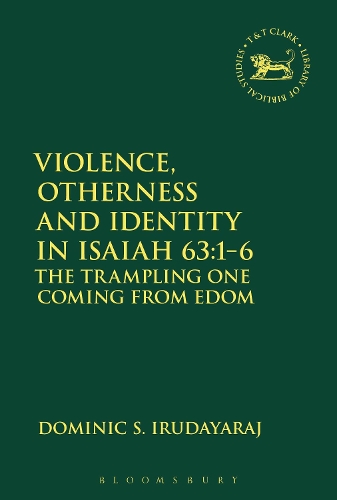
Violence, Otherness and Identity in Isaiah 63:1-6: The Trampling One Coming from Edom
(Paperback)
Available Formats
Publishing Details
Violence, Otherness and Identity in Isaiah 63:1-6: The Trampling One Coming from Edom
By (Author) Dominic S. Irudayaraj
Bloomsbury Publishing PLC
T.& T.Clark Ltd
20th September 2018
United Kingdom
Classifications
Tertiary Education
Non Fiction
Criticism and exegesis of sacred texts
Old Testaments
224.106
Physical Properties
Paperback
224
Width 156mm, Height 234mm
313g
Description
Violence disturbs. And violent depictions, when encountered in the biblical texts, are all the more disconcerting. Isaiah 63:1-6 is an illustrative instance. The prophetic text presents the "Arriving One" in gory details ('trampling down people'; 'pouring out their lifeblood' v.6). Further, the introductory note that the Arriving One is coming from Edom (cf. v.1) may suggest Israels unrelenting animosity towards Edom. These two themes: the "gory depiction" and "coming from Edom" are addressed in this book. Irudayaraj uses a social identity reading to show how Edom is consistently pictured as Israel's proximate and yet 'other'-ed entity. Approaching Edom as such thus helps situate the animosity within a larger prophetic vision of identity construction in the postexilic Third Isaian context. By adopting an iconographic reading of Isaiah 63:1-6, Irudayaraj shows how the prophetic portrayal of the 'Arriving One' in descriptions where it is clear that the 'Arriving One' is a marginalised identity correlates with the experiences of the "stooped" exiles (cf 51:14). He also demonstrates that the text leaves behind emphatic affirmations ('mighty' and 'splendidly robed' cf. v.1; alone cf. v.3), by which the relegated voice of the divine reasserts itself. It is in this divine reassertion that the hope of the Isaian communitys reclamation of its own identity rests.
Reviews
The volume should find a place in collections serving advanced students and scholars. * Religious Studies Review *
I highly recommend Irudayarajs book to scholars as well as students of the Bible because of its scholarly scrutiny and relevance It has something to say about the religious and racial conflicts that have happened and are still happening near and far. By constantly making who is (supposed to be) close kin other, often in the name of their God, people try to regain dominance that they think they used to possess. Irudayarajs book is a wakeup call for all of us to acknowledge such danger lurking in us and an invitation to find ways to live together in peace in spite of our disagreements and differences. * Asian American Theological Forum *
I enjoyed reading this well researched and stimulating book and appreciate the new light that it sheds upon the meaning of Isa. -- Professor Lena-Sofia Tiameyer * Journal of Semitic Studies *
Author Bio
Dominic S. Irudayaraj S.J. teaches in Hekima University College, Nairobi, Kenya.
